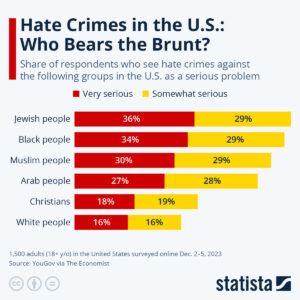INTRODUCTION
Hate crimes represent acts of violence, intimidation, or harassment targeting individuals or groups based on their race, religion, ethnicity, sexual orientation, gender identity, or other protected characteristics. These despicable acts not only inflict harm on victims but also undermine social cohesion, erode trust, and perpetuate prejudice and discrimination. In this comprehensive analysis, we’ll delve into the intricacies of hate crimes, examining their prevalence, motivations, impacts, legal frameworks, and strategies for prevention and response.

1. Prevalence of Hate Crimes:
- Hate crimes occur worldwide and manifest in various forms, including physical assaults, verbal abuse, vandalism, threats, and intimidation, motivated by bias or animosity towards the victim’s perceived identity or affiliation.
- Hate crimes target individuals or communities based on their race, ethnicity, religion, sexual orientation, gender identity, disability, nationality, or other immutable characteristics, reflecting deep-seated prejudices and social divisions.
2. Motivations for Hate Crimes:
- Hate crimes are fueled by bigotry, prejudice, and intolerance towards marginalized or minority groups, perpetuated by extremist ideologies, hate speech, and societal biases.
- Perpetrators of hate crimes may harbor racist, xenophobic, homophobic, or misogynistic beliefs, seeking to intimidate, subjugate, or eradicate individuals or communities deemed “other” or “inferior” based on their identity or background.
3. Types of Hate Crimes:
- Racially motivated hate crimes target individuals or groups based on their race, ethnicity, or nationality, perpetuating stereotypes, racial animosity, and ethnic tensions.
- Religious hate crimes involve attacks or vandalism targeting individuals or places of worship affiliated with specific religious beliefs or faith traditions, fueled by religious intolerance, sectarianism, or extremism.
- Gender-based hate crimes encompass violence, harassment, or discrimination directed against individuals or groups based on their gender identity, sexual orientation, or perceived deviation from traditional gender norms.

4. Impacts of Hate Crimes:
- Hate crimes inflict physical, emotional, and psychological harm on victims, causing trauma, fear, and distress, and undermining their sense of safety, security, and belonging.
- Hate crimes have broader societal impacts, fostering fear, division, and distrust within communities, and eroding social cohesion, multiculturalism, and tolerance.
- Hate crimes perpetuate systemic inequalities, discrimination, and marginalization, reinforcing power dynamics and barriers to equal rights and opportunities for affected groups.
5. Legal Frameworks and Prosecution:
- Many countries have enacted hate crime laws, statutes, and enhanced penalties to deter and punish perpetrators of bias-motivated violence and discrimination.
- Prosecuting hate crimes poses challenges for law enforcement agencies, including proving discriminatory intent, identifying bias as a motive, and gathering sufficient evidence to secure convictions.
- Enhancing legal protections, training law enforcement officers, and raising awareness about hate crimes are essential for ensuring effective investigation, prosecution, and adjudication of bias-motivated offenses.

6. Prevention and Response Strategies:
- Preventing hate crimes requires multi-pronged approaches that address root causes, promote diversity, foster intercultural dialogue, and challenge prejudice and stereotypes.
- Community-based initiatives, education programs, and awareness campaigns can promote tolerance, empathy, and understanding, empowering individuals to challenge hate speech and discriminatory attitudes.
- Strengthening partnerships between law enforcement agencies, civil society organizations, religious leaders, and community advocates is essential for coordinating prevention efforts, supporting victims, and promoting social inclusion.
7. Combating Online Hate Speech:
- Online platforms and social media have become breeding grounds for hate speech, misinformation, and radicalization, amplifying the spread of extremist ideologies and fueling real-world violence.
- Combating online hate speech requires collaboration between tech companies, governments, civil society, and users to develop effective content moderation policies, algorithms, and reporting mechanisms.
- Promoting digital literacy, critical thinking skills, and media literacy can empower individuals to recognize and counter online hate speech, fostering a more respectful and inclusive online environment.
8. Promoting Restorative Justice and Healing:
- Supporting victims of hate crimes requires providing trauma-informed care, legal assistance, and psychosocial support to address their physical, emotional, and psychological needs.
- Restorative justice approaches, including dialogue, mediation, and reconciliation processes, can facilitate healing, accountability, and community repair in the aftermath of hate crimes, empowering victims and communities to move forward from trauma and division.
In conclusion, hate crimes represent a grave threat to human rights, social cohesion, and democratic values, requiring concerted efforts from governments, civil society, and individuals to prevent and combat these egregious acts of violence and discrimination. By promoting tolerance, diversity, and inclusion, challenging prejudice and bigotry, and fostering solidarity and empathy, stakeholders can build more resilient and harmonious societies where all individuals are treated with dignity, respect, and equality under the law.



